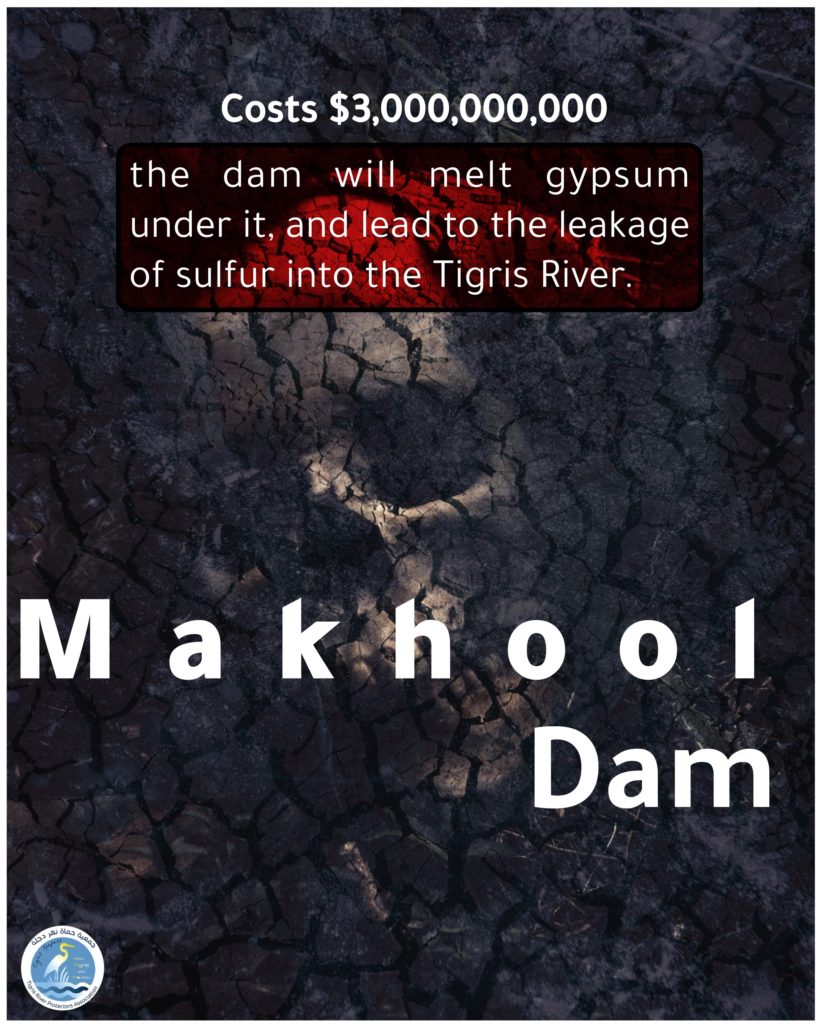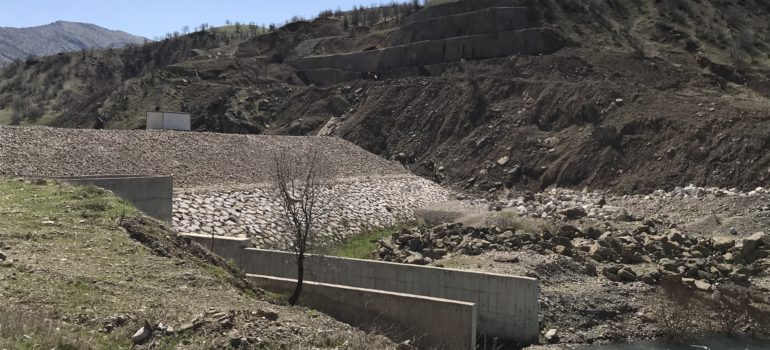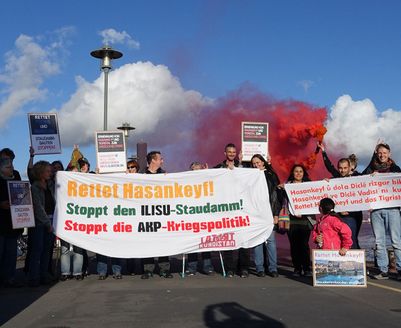Save The Tigris launches a new report on the Makhoul Dam.
Amsterdam, June 2022
The Iraqi government is intensifying its efforts to complete work on the Makhoul Dam. This water infrastructure is being built on the Tigris about 230 kilometres north of Baghdad, situated between the estuary of the Lesser Zab and Qaryat al Khaḑraniyah, north of Shirqat district. Construction has been progressing as the Ministry of Water Resources is currently establishing 80 residential units for the engineers and the technicians who will run the site. The dam is being built despite the fact that Iraq does not need more dams or large reservoirs. This was made clear in the government’s commissioned “Strategy for Water and Land Resources in Iraq”, known by its acronym SWLRI, and adopted in 2015.
The construction of the Makhoul Dam on the Tigris river is expected to create a 3227to 3600 metre-long reservoir. The reservoir is supposed to hold a storage capacity of 3 billion cubic metres, and cost $3 billion. According to the Iraqi government, water storage will be used for generating electricity, for irrigation purposes, as well as for prevention of flooding. Its construction plans are based on outdated research that goes back more than 40 years, since the dam was planned during the Saddam era in the early 2000s.
To date the impacts of the dam have been largely ignored by policymakers in Iraq even though it has been subject to many objections from Iraqi and international experts. This report aims to advocate for a thorough examination of the dam’s costs and claimed benefits, by sketching the environmental, cultural and social impacts of the dam, while taking into account the technical aspects. It is the product of result of field research at the dam construction site in 2021, which included interviews with key informants and communities that would be affected by the dam, as well as a review of the existing data and literature on the dam and its impacts.
If the federal government of Iraq continues with the construction of the Makhoul Dam, it will put the ecosystems and environment around the Makhoul Dam out of balance. By flooding upstream areas and decreasing the water flow downstream, it will negatively affect the water quality. It will also diminish the biodiversity along the whole course of the Tigris River and within the Marshes of southern Iraq. The Makhoul Dam will, moreover, damage parts of the world heritage site of the city of Ashur and place the whole city of Kar-Tikulti-Ninorta under water. It will also wipe out the majority of more than 250 archaeological sites, despite objection from the Iraqi Ministry of Culture and UNESCO. At the same time, the Makhoul Dam will cause loss of livelihoods and displace more than 100,000 people from 40 communities within the Saladin and Kirkuk governorates, the majority of whom have recently returned to rebuild their lives after years of displacement. Even if it is hard to measure the positive and negative effects of dams, on the ground the future cost of the Makhoul Dam can be perceived as much higher than the potential benefits of the dam.

Recommendations of the report:
- Halt the construction of the Makhoul Dam due to the aforementioned negative environmental, cultural and social-economic impacts;
- Consider alternatives to dam construction, including modernization of irrigation techniques and use of non-conventional water resources, such as rainwater harvesting wastewater recycling and other similar technologies;
- Prioritize negotiations with neighboring countries to agree on fair shares of water resources in the Tigris-Euphrates basin;
- Prioritize better coordination between the Iraqi federal government and the Kurdistan Region in Iraq and work toward a long-term protection plan to preserve Iraq’s rivers;
- Make use of local knowledge and expertise to carry out a comprehensive excavation of the archaeological sites at the dam area, regardless of whether the dam will be constructed.
Save the Tigris believes water is a resource that does not belong to any state, nation or sect. Since 2012, the Save the Tigris has been advocating against the construction of Ilisu, Daryan and other large dams in Iraq and the region to preserve the cultural and environmental heritage of the Tigris River, and promote sustainable and equitable use of water for all.
————————————-
For further information on the report, contact the campaign via:
James Bogue | Save the Tigris – The Netherlands | +31 6 42936763
E-mail: coordinator@savethetigris.org
and
Salman Khairalla | Humat Dijlah -Iraq | +964 780 678 6372E-mail: humat.dijlah@gmail.com




